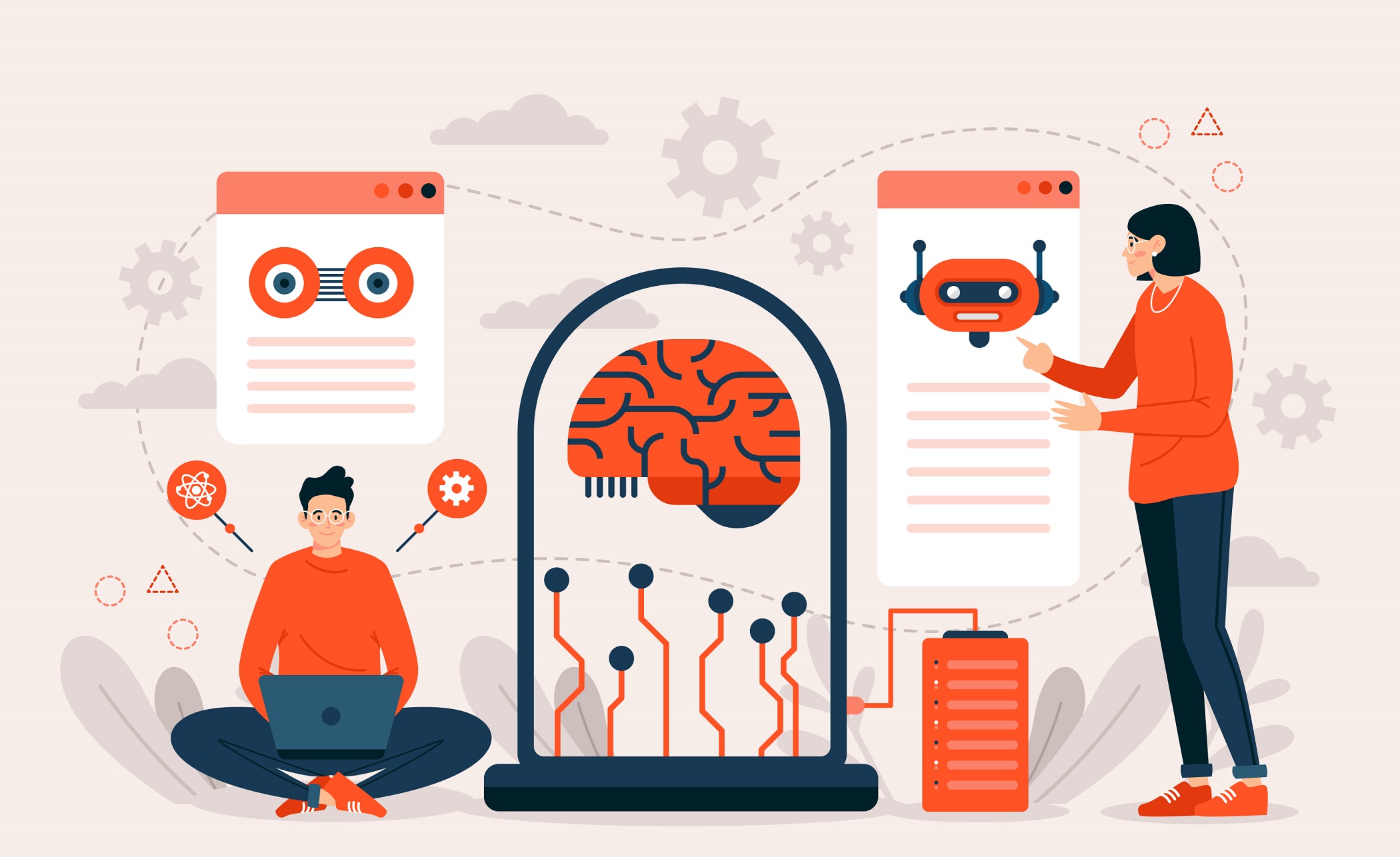Exploring the AI Job Market: What Skills are Needed in the Age of AI
Curious about the AI job market? Our article breaks down the essential skills you need to thrive in this dynamic field. We cover everything from technical know-how like programming and machine learning to crucial soft skills such as critical thinking and teamwork. Find out how to choose the right educational path, build an impressive portfolio, and make valuable connections in the AI community. Whether you’re just beginning or looking to advance your career, this guide offers practical tips to help you succeed.
I. Introduction
Artificial Intelligence is transforming industries across the globe, making it one of the most exciting and dynamic fields to work in today. As businesses and organizations increasingly integrate AI into their operations, the demand for skilled professionals who can harness this technology effectively is skyrocketing. But what exactly does it take to thrive in the AI job market? This article delves into the essential skills needed to succeed in the age of AI, covering both technical and non-technical competencies, educational pathways, and future trends. Whether you’re just starting your career or looking to pivot into AI, understanding these key areas will help you navigate and seize opportunities in this rapidly evolving field.
II. The Growing Demand for AI Skills
A. The Rise of AI in Various Industries
AI is no longer confined to the realms of science fiction or high-tech laboratories; it is now a critical component of many industries. From healthcare and finance to manufacturing and retail, AI technologies are being used to enhance efficiency, improve decision-making, and create innovative solutions. For instance, in healthcare, AI algorithms can predict patient outcomes and assist in diagnostic processes. In finance, AI-driven analytics help in fraud detection and risk management. This widespread adoption of AI has created a surge in demand for professionals who can develop, implement, and manage AI solutions. Companies are not only looking for experts in AI but also for those who can integrate AI capabilities into their existing systems, making AI skills invaluable across multiple sectors.
B. Job Roles Emerging in the AI Landscape
As AI continues to evolve, so too do the job roles associated with it. Traditional roles such as data scientists and machine learning engineers are still in high demand, but new positions are emerging as well. AI ethicists, for instance, are becoming crucial in ensuring that AI technologies are developed and used responsibly. Similarly, roles like AI product managers and AI consultants are gaining prominence, reflecting the need for professionals who can bridge the gap between technical teams and business objectives. Furthermore, the rise of AI has also led to the creation of hybrid roles that combine AI expertise with other disciplines, such as AI in healthcare or AI in marketing. These emerging roles highlight the diverse opportunities available in the AI job market and underscore the importance of acquiring a broad set of skills.
III. Essential Technical Skills for AI Professionals
A. Programming Languages
At the core of any AI system lies robust programming. Proficiency in programming languages is fundamental for anyone looking to enter the AI field. Python is the most popular language due to its simplicity and extensive libraries, such as TensorFlow and Keras, which are specifically designed for AI development. However, knowledge of other languages like R, Java, and C++ can also be advantageous. Each language has its strengths; for example, R is widely used in statistical analysis and data visualization, while C++ is preferred for high-performance applications. Mastering these languages allows AI professionals to write efficient algorithms, manipulate large datasets, and develop sophisticated models. Additionally, familiarity with software development tools and practices, such as version control with Git, is essential for collaborating on complex AI projects.
B. Machine Learning and Deep Learning
Machine learning (ML) and deep learning (DL) are the backbones of AI. Understanding the principles and techniques of ML, such as supervised and unsupervised learning, is crucial. Supervised learning involves training models on labeled data, while unsupervised learning deals with uncovering hidden patterns in unlabeled data. Deep learning, a subset of ML, uses neural networks with multiple layers to analyze complex data structures. Knowledge of frameworks like TensorFlow, PyTorch, and Scikit-learn is vital for building and deploying these models. Moreover, AI professionals need to grasp the concepts of overfitting, underfitting, and model evaluation metrics to fine-tune their models for optimal performance. As AI applications become more sophisticated, expertise in ML and DL will continue to be a critical asset.
C. Data Science and Analytics
Data is the fuel that powers AI, making data science skills indispensable for AI professionals. This involves collecting, cleaning, and preprocessing data to ensure it is suitable for analysis. Proficiency in data manipulation tools such as SQL and pandas is essential for handling large datasets. Moreover, understanding statistical methods and data visualization techniques enables AI professionals to extract meaningful insights and communicate findings effectively. Data science also involves exploratory data analysis (EDA), which helps in identifying patterns and anomalies in data. By mastering these skills, AI professionals can better understand the data they are working with, leading to more accurate and reliable AI models.
IV. Important Non-Technical Skills
A. Critical Thinking and Problem-Solving
While technical skills are crucial, non-technical skills are equally important in the AI job market. Critical thinking and problem-solving abilities are at the top of this list. AI professionals often encounter complex problems that require innovative solutions. Being able to analyze a problem, break it down into manageable parts, and develop a strategic approach to solve it is essential. This involves not just applying existing techniques but also thinking creatively to develop new methods or improve existing ones. Effective problem-solving also requires the ability to adapt to new information and pivot strategies as needed. By honing these skills, AI professionals can tackle challenges more effectively and drive successful outcomes in their projects.
B. Communication and Collaboration
In a field as interdisciplinary as AI, strong communication and collaboration skills are paramount. AI projects often involve teams with diverse expertise, including data scientists, software engineers, business analysts, and domain experts. Being able to communicate complex technical concepts to non-technical stakeholders is crucial for ensuring that everyone is aligned and working towards the same goals. This includes writing clear and concise reports, giving presentations, and actively participating in meetings. Additionally, collaboration skills are essential for working effectively within a team, as AI projects typically require input from multiple perspectives. By fostering open communication and a collaborative spirit, AI professionals can contribute to more cohesive and productive teams.
C. Adaptability and Continuous Learning
The field of AI is constantly evolving, with new technologies, methodologies, and best practices emerging at a rapid pace. As such, adaptability and a commitment to continuous learning are vital for AI professionals. This means staying updated with the latest research, tools, and trends in the industry. Engaging in lifelong learning through online courses, attending conferences, and participating in workshops can help professionals stay ahead of the curve. Additionally, being adaptable means being open to change and willing to explore new approaches when traditional methods fall short. By embracing a mindset of continuous improvement and adaptability, AI professionals can remain relevant and competitive in the fast-paced world of AI.
V. Education and Certification Paths
A. Formal Education: Degrees and Programs
A strong educational foundation is often the first step towards a successful career in AI. Formal education, such as a bachelor’s or master’s degree in computer science, engineering, or a related field, provides a comprehensive understanding of the theoretical and practical aspects of AI. Many universities now offer specialized programs in AI or machine learning, covering essential topics like algorithms, data structures, and neural networks. Advanced degrees, such as a PhD, can open doors to research positions and academic roles, where individuals can contribute to the development of new AI technologies. While formal education is not the only path to an AI career, it provides a solid grounding in the fundamental principles and methodologies that underpin the field.
B. Online Courses and Bootcamps
For those looking to transition into AI or enhance their existing skills, online courses and bootcamps offer a flexible and accessible alternative to traditional education. Platforms like Coursera, edX, and Udacity provide courses taught by experts from leading institutions and companies. These courses often include hands-on projects and real-world applications, allowing learners to build practical experience. Bootcamps, such as those offered by General Assembly and Springboard, provide intensive, short-term training programs designed to equip students with the skills needed to enter the AI job market quickly. By completing these courses and bootcamps, individuals can gain valuable knowledge and experience, making them more competitive candidates for AI roles.
C. Industry Certifications
In addition to formal education and online courses, industry certifications can validate an individual’s skills and expertise in AI. Certifications from reputable organizations, such as the TensorFlow Developer Certificate or the AWS Certified Machine Learning – Specialty, demonstrate a high level of proficiency in specific AI technologies and tools. These certifications are often recognized and valued by employers, making them a valuable addition to any AI professional’s resume. Furthermore, the process of preparing for and obtaining these certifications helps reinforce key concepts and skills, ensuring that individuals are well-equipped to handle the demands of the AI job market.
VI. Building a Strong AI Portfolio
A. Personal Projects and Open Source Contributions
One of the most effective ways to showcase your AI skills is through personal projects and contributions to open source projects. Personal projects allow you to apply your knowledge to real-world problems, demonstrating your ability to develop and implement AI solutions. These projects can range from building simple machine learning models to creating complex AI applications. Open source contributions, on the other hand, enable you to collaborate with other AI professionals and gain exposure to different approaches and methodologies. By contributing to well-known projects on platforms like GitHub, you can build a portfolio that highlights your skills and expertise to potential employers.
B. Internships and Work Experience
Gaining practical experience through internships and work experience is crucial for building a strong AI portfolio. Internships provide an opportunity to work on real-world AI projects under the guidance of experienced professionals. This hands-on experience is invaluable for developing technical skills and understanding the nuances of working in an AI environment. Additionally, internships can lead to full-time job offers and help you build a network of industry contacts. Work experience, whether in AI-specific roles or related fields, further strengthens your portfolio by demonstrating your ability to apply AI techniques in a professional setting. This experience can set you apart from other candidates and increase your chances of landing a desirable AI job.
C. Showcasing Your Work
Effectively showcasing your work is essential for attracting the attention of employers and industry professionals. Creating a professional online presence through platforms like LinkedIn, GitHub, and a personal website allows you to highlight your skills, projects, and accomplishments. Detailed project descriptions, along with code samples and results, provide a comprehensive view of your capabilities. Additionally, writing blog posts or articles about your AI projects and experiences can help establish you as a thought leader in the field. By actively showcasing your work, you can build a strong personal brand and enhance your visibility in the AI job market.
VII. Networking and Community Involvement
A. Joining AI and Tech Communities
Networking and community involvement are crucial components of a successful AI career. Joining AI and tech communities, both online and offline, allows you to connect with other professionals, share knowledge, and stay updated on industry trends. Online communities, such as AI-focused forums and social media groups, provide a platform for discussing challenges, seeking advice, and collaborating on projects. Offline communities, such as local meetups and professional organizations, offer opportunities for face-to-face interactions and networking events. By actively participating in these communities, you can build relationships, gain insights, and expand your professional network.
B. Attending Conferences and Meetups
Attending conferences and meetups is another effective way to network and stay informed about the latest developments in AI. Conferences, such as the Neural Information Processing Systems (NeurIPS) and the International Conference on Machine Learning (ICML), bring together leading researchers, practitioners, and industry experts. These events provide a platform for learning about cutting-edge research, discovering new tools and technologies, and gaining insights from keynote speakers and panel discussions. Meetups, on the other hand, offer more intimate settings for networking and learning from peers. By participating in conferences and meetups, you can stay current with the latest advancements in AI and build valuable connections with other professionals.
C. Leveraging Social Media and Professional Networks
Social media and professional networks are powerful tools for building your AI career. Platforms like LinkedIn, Twitter, and Medium allow you to connect with industry professionals, share your work, and stay informed about the latest trends and opportunities. Engaging with AI thought leaders, joining relevant groups, and participating in discussions can help you expand your network and enhance your visibility. Additionally, using these platforms to share your insights, projects, and accomplishments can establish you as a credible and knowledgeable professional in the AI field. By leveraging social media and professional networks, you can build a strong personal brand and create opportunities for career advancement.
VIII. Future Trends in the AI Job Market
A. Evolving Job Roles and Responsibilities
As AI continues to advance, the job roles and responsibilities within the field are evolving. New positions are emerging, and existing roles are becoming more specialized. For example, roles like AI ethicists, who focus on ensuring the ethical use of AI, and AI auditors, who assess the accuracy and fairness of AI systems, are becoming increasingly important. Additionally, the integration of AI into various industries is creating hybrid roles that combine AI expertise with domain-specific knowledge. Understanding these evolving job roles and staying adaptable to changes in the job market is crucial for long-term career success in AI.
B. The Impact of AI on Employment Across Sectors
AI is not only creating new job roles but also transforming existing ones across various sectors. In healthcare, AI is being used to enhance diagnostic accuracy and streamline administrative processes, leading to new opportunities for healthcare professionals with AI skills. In finance, AI-driven analytics and automated trading systems are reshaping roles in investment management and risk assessment. Understanding the impact of AI on different sectors can help professionals identify emerging opportunities and align their skills with market demands. Additionally, being aware of potential challenges, such as job displacement due to automation, is important for developing strategies to stay competitive in the job market.
C. Preparing for the Future: Lifelong Learning and Skill Development
The rapid pace of AI advancements makes lifelong learning and skill development essential for career longevity. Professionals must continuously update their knowledge and skills to keep up with new technologies, methodologies, and best practices. This involves engaging in ongoing education through courses, workshops, and conferences, as well as staying informed about industry trends through research and networking. Additionally, developing a mindset of continuous improvement and adaptability is crucial for navigating the ever-changing landscape of the AI job market. By committing to lifelong learning and skill development, professionals can remain relevant and thrive in the age of AI.
IX. Conclusion
The AI job market offers exciting opportunities for those equipped with the right skills and knowledge. From technical expertise in programming, machine learning, and data science to essential non-technical skills like critical thinking, communication, and adaptability, a well-rounded skill set is key to success. Education and certification pathways provide a foundation for building these skills, while practical experience and a strong portfolio showcase your abilities to potential employers. Networking and community involvement further enhance your career prospects, and staying informed about future trends ensures you remain competitive in this dynamic field. By understanding and developing the skills needed in the age of AI, you can unlock a wealth of opportunities and thrive in the ever-evolving AI job market.







